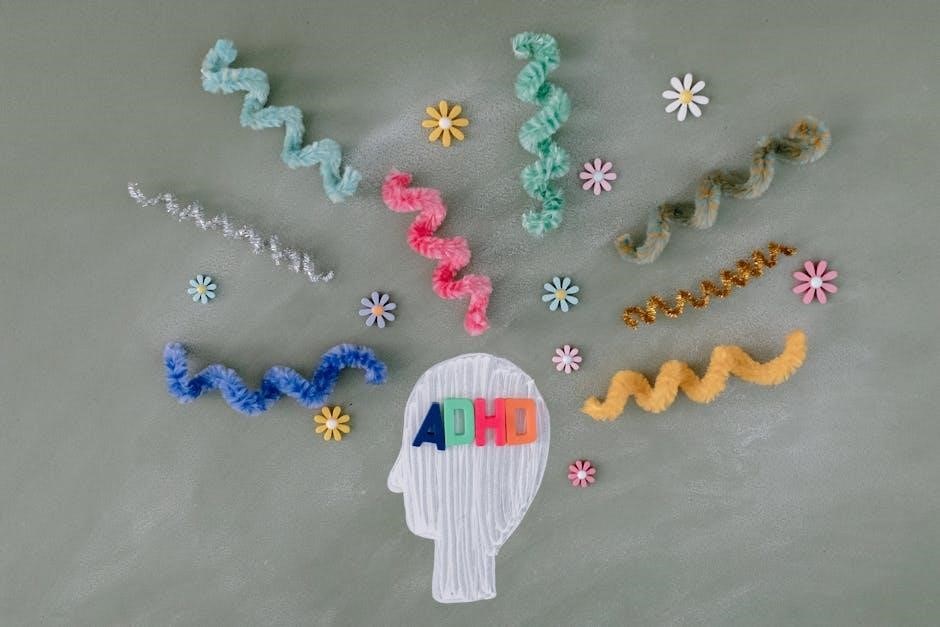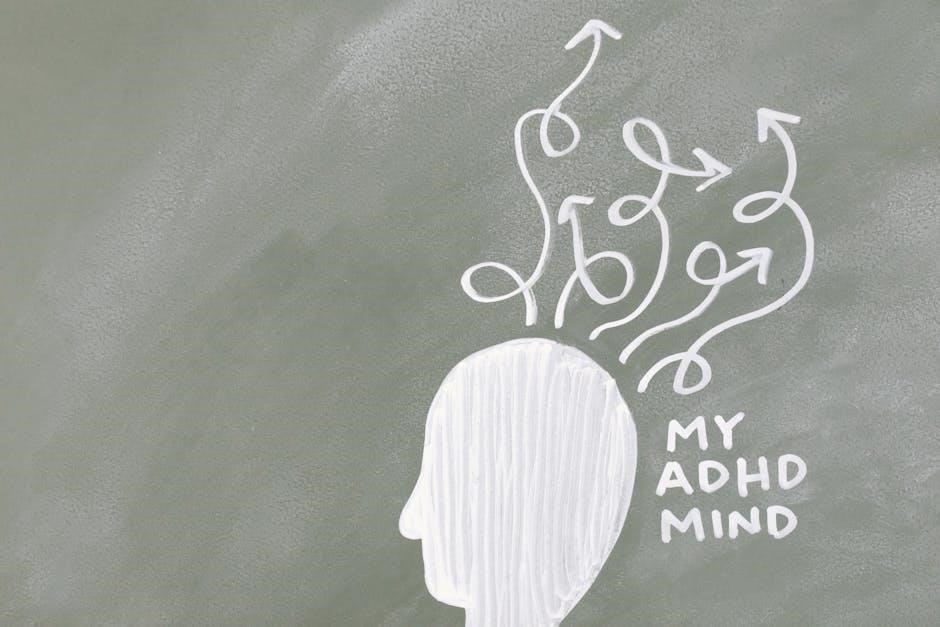Therapists play a key role in managing ADHD through evidence-based interventions‚ combining pharmacological and non-pharmacological strategies to address symptoms and improve functional outcomes in individuals․
1․1 Understanding ADHD: Definition‚ Symptoms‚ and Prevalence
ADHD‚ or Attention-Deficit/Hyperactivity Disorder‚ is a neurodevelopmental disorder characterized by persistent patterns of inattention‚ hyperactivity‚ and impulsivity․ Common symptoms include difficulty sustaining focus‚ impulsive behaviors‚ and excessive activity․ ADHD is one of the most prevalent childhood disorders‚ affecting approximately 5-8% of children globally‚ with symptoms often persisting into adulthood․ It frequently co-occurs with other conditions like anxiety‚ depression‚ and autism spectrum disorder․ Early identification and understanding of these symptoms are critical for developing effective intervention strategies and improving outcomes for individuals with ADHD․
1․2 The Role of Therapists in ADHD Management
Therapists play a pivotal role in ADHD management by providing evidence-based interventions tailored to individual needs․ They combine pharmacological strategies with behavioral techniques‚ such as cognitive-behavioral therapy‚ to address symptoms and improve daily functioning․ Therapists also collaborate with educators and families to implement environmental modifications and educational support․ Their expertise in addressing comorbid conditions like anxiety and depression is crucial for holistic care․ By fostering a supportive and structured environment‚ therapists empower individuals with ADHD to develop self-regulation skills and enhance their quality of life․ Their work is essential for helping patients navigate challenges and achieve long-term functional outcomes․

Pharmacological Interventions for ADHD
Pharmacological interventions remain central in ADHD management‚ primarily using stimulant and non-stimulant medications to reduce hyperactivity and improve attention‚ enhancing daily functioning and overall well-being․
2․1 Overview of Stimulant Medications
Stimulant medications‚ such as methylphenidate and amphetamines‚ are the most commonly prescribed and effective treatments for ADHD․ They work by increasing dopamine and norepinephrine levels in the brain‚ improving attention and reducing hyperactivity․ These medications are available in various forms‚ including immediate-release and extended-release options‚ allowing for tailored treatment plans․ While generally safe‚ stimulants may cause side effects like insomnia or appetite loss․ Regular monitoring by healthcare providers is essential to optimize benefits and minimize risks․ Therapists should stay informed about these medications to support patients in making informed decisions and managing potential challenges․
2․2 Non-Stimulant Medications and Their Efficacy
Non-stimulant medications‚ such as atomoxetine‚ offer an alternative for patients who cannot use stimulants due to side effects or comorbid conditions․ These medications primarily target norepinephrine levels in the brain‚ improving attention and reducing impulsivity․ While generally less effective than stimulants‚ non-stimulants provide consistent benefits for some individuals․ They are often recommended for those with anxiety or substance use disorders․ Approved by regulatory agencies‚ these medications are a viable option for tailored ADHD management․ Therapists should be aware of their efficacy and potential benefits to support personalized treatment plans and patient outcomes effectively․

Non-Pharmacological Interventions
Non-pharmacological interventions focus on behavioral techniques‚ lifestyle changes‚ and environmental adjustments to manage ADHD symptoms effectively in both children and adults‚ complementing pharmacological treatments when necessary․
3․1 Behavioral Therapy Techniques
Behavioral therapy techniques are cornerstone interventions for ADHD‚ focusing on modifying maladaptive behaviors through positive reinforcement‚ token economies‚ and clear boundary setting․ These methods help individuals with ADHD manage impulsivity‚ improve focus‚ and develop self-regulation skills․ Techniques such as contingency management and behavioral contracting are often employed to encourage desired behaviors and reduce disruptive actions․ Parents‚ educators‚ and therapists are trained to implement these strategies consistently across environments‚ ensuring a cohesive approach to symptom management․ Evidence-based behavioral interventions are particularly effective in children‚ laying the foundation for long-term behavioral and emotional stability․ They complement pharmacological treatments and are adaptable to various settings․
3․2 Cognitive-Behavioral Therapy (CBT) for ADHD
Cognitive-Behavioral Therapy (CBT) is a highly effective intervention for ADHD‚ focusing on identifying and modifying negative thought patterns and maladaptive behaviors․ Techniques such as cognitive restructuring‚ mindfulness‚ and problem-solving training help individuals manage impulsivity‚ improve focus‚ and enhance self-regulation․ CBT also addresses emotional dysregulation‚ teaching patients to recognize and manage triggers of frustration or anxiety․ By setting clear goals and practicing skills in structured sessions‚ individuals with ADHD can develop strategies to improve daily functioning and reduce symptoms․ CBT is particularly beneficial for adults and adolescents‚ offering a tailored approach to address unique challenges and promote long-term behavioral change․
3․3 Educational and Environmental Modifications
Educational and environmental modifications are crucial for supporting individuals with ADHD‚ creating structured and conducive learning and living environments․ Strategies include breaking tasks into smaller steps‚ using visual reminders‚ and minimizing distractions․ Environmental adjustments‚ such as noise reduction or ergonomic seating‚ can enhance focus․ Incorporating movement breaks and physical activity into daily routines helps regulate hyperactivity․ Collaborating with educators to implement Individualized Education Programs (IEPs) ensures tailored support for students․ These modifications not only improve academic performance but also promote overall well-being‚ helping individuals with ADHD thrive in various settings by addressing their unique needs and fostering a supportive ecosystem․
Emerging and Alternative Therapies
Emerging therapies like neurofeedback and mindfulness-based interventions offer innovative approaches to managing ADHD‚ focusing on self-regulation and brain function to complement traditional treatments․
4․1 Neurofeedback and Biofeedback Training
Neurofeedback and biofeedback training are emerging therapies that help individuals with ADHD learn to self-regulate their brain activity and physiological responses․ Neurofeedback involves using electroencephalography (EEG) to provide real-time feedback on brainwave patterns‚ helping individuals control attention and impulse control․ Biofeedback focuses on training individuals to monitor and manage physiological responses‚ such as heart rate and muscle tension‚ to reduce hyperactivity and stress․ These non-invasive approaches aim to enhance self-awareness and improve emotional regulation‚ offering a promising complement to traditional ADHD treatments․ Research suggests these methods can lead to sustained behavioral improvements‚ particularly when integrated into comprehensive therapeutic plans․
4․2 Mindfulness-Based Interventions
Mindfulness-based interventions are increasingly recognized as effective non-pharmacological approaches for managing ADHD symptoms․ These techniques‚ rooted in meditation and present-moment awareness‚ help individuals improve focus‚ reduce impulsivity‚ and enhance emotional regulation․ By practicing mindfulness‚ individuals with ADHD can better manage distractions and develop greater self-awareness․ Research indicates that mindfulness-based programs may reduce ADHD symptoms‚ improve cognitive functioning‚ and enhance overall well-being․ These interventions are particularly beneficial for adults‚ as they promote self-monitoring and self-control․ When integrated into therapeutic plans‚ mindfulness practices offer a holistic approach to addressing ADHD‚ complementing traditional treatments and fostering long-term behavioral change․

Managing Comorbid Conditions
Managing comorbid conditions in ADHD is crucial for effective treatment․ Many individuals experience overlapping mental health issues like anxiety‚ depression‚ or autism‚ requiring integrated therapeutic approaches․
5․1 Addressing Anxiety and Depression in ADHD Patients
Individuals with ADHD often experience comorbid anxiety and depression‚ which can exacerbate symptoms and hinder daily functioning․ Therapists should employ integrated approaches to address these co-occurring conditions․ Cognitive-behavioral therapy (CBT) is particularly effective in helping patients identify and challenge negative thought patterns․ Mindfulness-based interventions can also reduce stress and improve emotional regulation․ Additionally‚ addressing interpersonal challenges and stigma associated with ADHD is crucial for improving mental health outcomes․ A comprehensive treatment plan that incorporates both ADHD and mental health strategies ensures holistic care and better quality of life for patients․
5․2 Strategies for Co-Occurring Autism Spectrum Disorder
Co-occurring ADHD and Autism Spectrum Disorder (ASD) presents unique challenges‚ requiring tailored interventions․ Therapists should focus on improving social communication‚ reducing sensory sensitivities‚ and enhancing adaptive behaviors․ Behavioral therapy‚ such as applied behavior analysis (ABA)‚ can address shared symptoms like inattention and impulsivity․ Structured routines and visual supports can provide stability for individuals with ASD․ Additionally‚ incorporating sensory-friendly environments and addressing comorbid anxiety are crucial․ Collaborative approaches involving both ADHD and ASD strategies ensure comprehensive care‚ improving social and functional outcomes for individuals with these co-occurring conditions․

Supporting Adults with Undiagnosed ADHD
Adults with undiagnosed ADHD often face challenges in daily functioning‚ relationships‚ and mental health․ Therapists can provide tailored strategies to address these issues‚ improving overall well-being․
6․1 Identifying Late-Onset ADHD
Identifying late-onset ADHD in adults requires careful evaluation of symptoms such as inattention‚ disorganization‚ and impulsivity‚ which may emerge or worsen over time․ Many adults with undiagnosed ADHD struggle with relationships‚ education‚ and career advancement due to untreated symptoms․ Mental health professionals must consider ADHD in adults presenting with challenges like poor time management‚ low self-esteem‚ or difficulty maintaining focus․ Proper diagnosis involves assessing childhood behaviors and current impairment‚ as well as ruling out comorbid conditions like anxiety or depression․ Early identification is crucial for improving quality of life and functional outcomes․
6․2 Improving Functional Outcomes in Adults
Improving functional outcomes in adults with ADHD requires tailored interventions focusing on daily living skills‚ workplace strategies‚ and relationship management․ Techniques such as behavioral coaching‚ cognitive-behavioral therapy‚ and environmental modifications can enhance productivity and reduce stress․ Adults benefit from learning time management‚ prioritization‚ and task-breaking skills to improve organization․ Additionally‚ addressing emotional dysregulation and impulsivity through mindfulness practices or self-monitoring tools can lead to better decision-making․ Support systems‚ such as therapy groups or vocational counseling‚ further aid in achieving independence and personal goals‚ ultimately improving overall quality of life and long-term success․
ADHD interventions require a multi-faceted approach‚ combining therapy‚ education‚ and support․ Future research should focus on optimizing treatments and addressing underserved populations to enhance outcomes․
7․1 Best Practices for Therapists
Therapists should adopt a multi-modal approach‚ combining evidence-based therapies like CBT and behavioral interventions․ Regular monitoring of symptoms and functional outcomes is essential․ Collaboration with other healthcare providers ensures comprehensive care․ Staying updated on research and guidelines is crucial for effective practice․ Tailoring interventions to individual needs‚ including addressing co-occurring conditions‚ enhances therapeutic success․ Providing psychoeducation to patients and families fosters better understanding and adherence to treatment plans․ Encouraging self-management strategies and promoting a supportive environment can significantly improve long-term outcomes for individuals with ADHD․ Continuous professional development ensures therapists remain equipped to deliver high-quality‚ patient-centered care․
7․2 Advances in ADHD Research and Therapy
Recent advancements in ADHD research emphasize personalized treatment approaches and innovative therapies․ Neurofeedback and mindfulness-based interventions are gaining traction as effective complementary methods․ Studies highlight the importance of early diagnosis and tailored interventions to address both ADHD symptoms and co-occurring conditions․ Emerging technologies‚ such as digital tools for monitoring and skill-building‚ are transforming therapeutic practices․ Ongoing research focuses on optimizing pharmacological and non-pharmacological strategies‚ ensuring better functional outcomes for individuals across all age groups․ These developments underscore the evolving nature of ADHD management‚ offering hope for more targeted and impactful therapies in the future․



